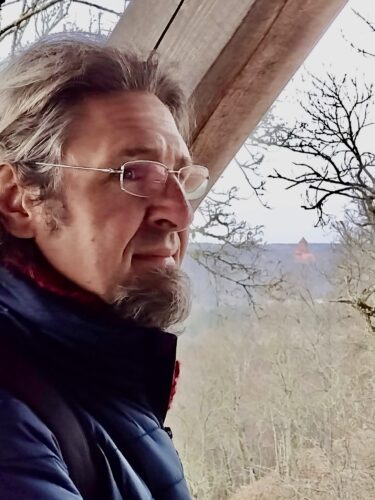
Robert Schnettler has been writing music in one capacity or another since he was a child and is most heavily influenced by the goth and shoegaze movements of the mid to late 80’s, the ambient electronic movement of the early to mid 90’s and the post rock movement of the mid 2000’s.
His current project The Evil Winters recently released a new record called “Variations In Joyful Apotheosis” which you can check out here.
I caught up with Robert to talk about his early musical experiences, how he started playing music and the making of the new release.
CMM-What was the first music that really made an impact on you as a kid and what artist or band did you enjoy the most?
Robert-My mother always had music playing in the house, and it was thematically all over the place, she would routinely play anything from Abba to Rodgers and Hammerstein, to Rachmaninoff to Smokey Robinson and the Miracles and everything in between. One of her very favorite albums was “Greatest Stories Live” by Harry Chapin. To this day I can sing that album end to end from memory. I loved his stories and his arrangements on that album. It had a very powerful impact on how I interpret the world and despite the fact that I write very few lyrics in my music in general, I believe that his influence is one of the reasons that attempting to foster emotional response through story is such an important part of my process. In my teenage years, I fell in love with goth and shoegaze. The Cure was/is a very very big influence on the way that I conceive of layering sound and when Loveless (My Bloody Valentine) came out…my world simply changed. They left an indelible mark on me and on music in general.
CMM-When did you start playing music and writing songs?
I started writing music in my early teens, I saved up for my first acoustic guitar when I was 13 years old, my first electric followed a couple of years later. I have always really been into writing my own music and really wanted to figure out how to record it, I discovered that a karaoke machine that my mother purchased had a single track “sound on sound capability, so I began recording sketches on that. It all sounded like crap, but I could experiment with layering which felt revolutionary to me at the time and It was quite fun.
When I was 17 I worked briefly with a composer named Paul Branescu. He would host a handful of us, all roughly the same age, and we would improvise together. He recorded everything that we did and would have the work transcribed. My experiences in those handful of sessions dramatically altered the way that I thought about music at the time and informs the way that I compose to this very day. Through those sessions I learned to follow the music where it leads and most importantly, that there are no mistakes. In all honesty, if it were not for those sessions, I am not certain that I would have continued writing music. Paul opened a world of opportunity for me by simply providing a space in which my contributions were respected. I will never forget that experience, what I learned from it and how it felt.
CMM-You recently released an E.P. called “Variations In Joyful Apotheosis”. What was the writing and recording process like? What gear and instruments did you use during the sessions?
The songs on Variations in Joyful Apotheosis span about 5 years worth of work. The album contains the emotional remnants of the coming of age of my daughter, my ascent into my 5th decade on this planet and the magic and joy inherent in the discovery of new love. Variations in Joyful Apotheosis also represents a new artistic direction exploring more deliberately the Neo Classical, Ambient and Experimental genres.
Typically, I do all of my composing and recording in my little basement studio. I have a Clarett 4-pre that I record with, all of my arranging and midi work was done in Logic. On this release, I use the East West libraries for orchestral and ethnic instrument samples with a sprinkling of Spitfire Labs and Native Instruments libraries alongside recordings of my guitar (Epiphone Swingster, Peavey Basic 112 and/or a Carvin tube combo, many pedals, big fan of Strymon El Capistan, Mercury 7 reverb, Swollen Pickle).
CMM-If you could do a score for any film director, who would it be and what would the film be about?
Robert-One of my dreams is to one day score for film and I think if I had to choose a director, I would choose Denis Villeneuve. I have a deep love of science fiction and Villeneuve has a very strong understanding of the interplay between image and sound. I cry like a baby every time I watch Arrival, it’s the music and the story that gets me and I would so dearly love to be a part of such a wonderful expression of ideas and emotion. I think I would happily score anything by Villeneuve, but I would love a complex sci-fi storyline like Arrival, or Primer or perhaps Her to work with, something that is as deeply rooted in the human experience as it is in science.
CMM-What do you have coming up next? Any new recordings or shows?
Robert-I am starting to work on some new material which I am excited about, but I quite literally started about 48 hours ago, so it is all quite new. My intent is to continue working in the Ambient and Neo-Classical genres but ultimately, it is difficult to gauge where the music will lead so early in the process. I am also considering going back and releasing some of my older works that I produced under the monikers thirdhand and Sweet Dreams St. Francis, there is a lot of material that I feel good about that is mostly just gathering dust.







